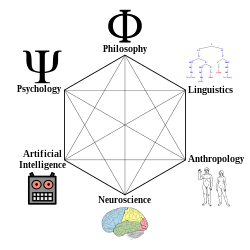
Back Kognitiewe wetenskap Afrikaans علوم استعرافية Arabic Koqnitivistika Azerbaijani Кагнітыўныя навукі Byelorussian Когнитивна наука Bulgarian সংজ্ঞানাত্মক বিজ্ঞান Bengali/Bangla Kognitivna nauka BS Ciència cognitiva Catalan Kognitivní věda Czech Kognitionsvidenskab Danish

Cognitive science is the interdisciplinary, scientific study of the mind and its processes.[2] It examines the nature, the tasks, and the functions of cognition (in a broad sense). Mental faculties of concern to cognitive scientists include language, perception, memory, attention, reasoning, and emotion; to understand these faculties, cognitive scientists borrow from fields such as linguistics, psychology, artificial intelligence, philosophy, neuroscience, and anthropology.[3] The typical analysis of cognitive science spans many levels of organization, from learning and decision to logic and planning; from neural circuitry to modular brain organization. One of the fundamental concepts of cognitive science is that "thinking can best be understood in terms of representational structures in the mind and computational procedures that operate on those structures."[3]
- ^ Miller, George A (1 March 2003). "The cognitive revolution: a historical perspective". Trends in Cognitive Sciences. 7 (3): 141–144. doi:10.1016/S1364-6613(03)00029-9. ISSN 1364-6613. PMID 12639696. S2CID 206129621. Archived from the original on 21 November 2018. Retrieved 5 February 2023.
- ^ "Ask the Cognitive Scientist". American Federation of Teachers. 8 August 2014. Archived from the original on 17 September 2014. Retrieved 25 December 2013.
Cognitive science is an interdisciplinary field of researchers from Linguistics, psychology, neuroscience, philosophy, computer science, and anthropology that seek to understand the mind.
- ^ a b Thagard, Paul, Cognitive Science Archived 15 July 2018 at the Wayback Machine, The Stanford Encyclopedia of Philosophy (Fall 2008 Edition), Edward N. Zalta (ed.).